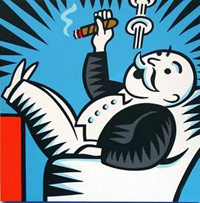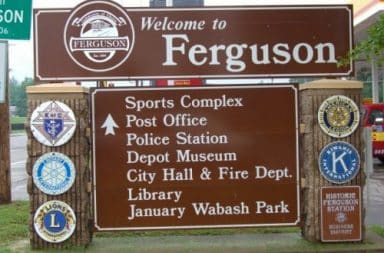Not satisfied with what it has done to destroy the American economy, the US government passed a few laws that put new regulatory bodies in place. This would be totally awesome if the old regulatory bodies, Fannie Mae and Freddie Mac, weren't the enablers of the largest fiscal crisis since my grandpa was in grade school.

You have been elected Federal Chairman of the Board. Collect whatever feels sorta necessary from every American citizen.Fannie and Freddie are in charge of insuring that banks get paid on mortgages, even if they have to use your tax dollars to do it. They were also holding most of the subprime paper when the housing bubble popped like, well, like a bubble. That would totally suck for them if they were a real company and not a government organization meant to help keep the currently rich currently rich.
Next year, however, Fannie and Freddie won't have to worry about a thing (not that they ever did but you know, I'm pretending there's some bastion of fairness and respect in our nation's capital—I'm a rube) because the United States Government (motto: What Loan?) now has an agency dedicated to seeking and eliminating systemic risk.
As anyone who had a mortgage can tell you, there is nothing better than the Federal Government going around guaranteeing piles of crap will turn into cash.I think I speak for all the people who've lost money in their 401k's, who've lost their jobs, and for all those making so much less than they did a year ago when I say, "Super huge tits for them then."
The fuckers.
Now, whenever the government gets a new regulatory agency that relates to finance, I like to take a look at it and figure out just how exactly they plan on ripping us off (ripping off its people is what governments are for).
Our first step on this journey is defining systemic risk. I mean, the name sounds kind of like a cross between a venereal disease and a Stallone movie so we should probably avoid using root words and go where all scholarly geniuses go to get definitions: Google.
Google provided a link to Freddie Mac, which defines systemic risk thusly: Chance of loss when economic disturbances affect a financial system as a whole, as opposed to firms individually. Typically characterized by weakening confidence in the payment and information system that supports a country's financial system.
I have two major problems with this definition. First, there is almost no way to harm something as a whole without harming its individual parts. Second, there is no way anyone in the world should have any kind of confidence in a government that steals from its people to prop up a banking cartel.
(Side note: Do you think I'm getting cynical? I think I'm getting cynical.)
 Now, as you may or may not remember, I read a lot of boring stuff as part of my job. And one of the most boring things I've ever read came from the Financial Regulatory Reform Task Force of the American Academy of Actuaries (which does not sound like the kind of organization that knows how to throw a quality kegger).
Now, as you may or may not remember, I read a lot of boring stuff as part of my job. And one of the most boring things I've ever read came from the Financial Regulatory Reform Task Force of the American Academy of Actuaries (which does not sound like the kind of organization that knows how to throw a quality kegger).
Anyway, to keep me from going insane typing out Financial Regulatory Reform Task Force of the American Academy of Actuaries, they will heretofore and forever more be referred to as FRRTFAAA which, when spoken aloud, pretty much sounds like what they are: a smelly cover-up for yet another government takeover of your money.
Anyway, time to cut and paste:
The Financial Regulatory Reform Task Force of the American Academy of Actuaries, through its review of the insurance industry and the broader financial sector, has concluded that new key functions are necessary for effective systemic risk regulation:
Federal regulation of systemic risk for all sectors of the financial services industry, including the insurance industry, is needed;
No government regulatory body can prevent financial collapse in a country where the currency is based on nothing more than confidence.You hear that? Every industry that deals with large amounts of money needs federal regulation. Because, as anyone who had a mortgage can tell you, there is nothing better than the Federal Government going around guaranteeing piles of crap will turn into cash. That's just good government, dammit!
A federally based systemic risk regulator (SRR) should compile data and use metrics to facilitate national and global monitoring of systemic risk, establish criteria for active regulatory intervention or takeover of financial institutions, and work with functional regulators from within the United States, other countries, and international regulatory bodies to take action to mitigate any identified systemic risk;
I know, I know. This is how actuaries write though (side note: one of my cousins is an actuary and I've probably heard him say ten words in fifteen years—not for nothing, as the man says). Let's look at that sentence up there again. If I were to rewrite it into English I would write:
One dude will have access to a bunch of data which reveals who has what money and where said money is located, he'll write up a plan to steal wealth from American citizenry should we need to give these rich companies more money and he will work with politicians, who he will bribe and by whom he will be bribed.
(And yes, I guess I am getting cynical.)
The effectiveness of the SRR to regulate systemically important companies requires the evaluation of company risk management processes;
The Head Regulator will need to know how companies manage their risk if the head regulator is to manage said company's risk for them (really, that one is kind of obvious).
The SRR should recognize the ability of the current state-based functional regulatory system to help provide oversight and supervision of systemic risk within the insurance industry.
And we'll throw state regulators a bone too so a few governors don't get all pissy.
So there you go, American People. You no longer have to worry about another financial collapse again. There's a federal body that is large and in charge. They are getting access to insider information which they will not use to break rules and accumulate wealth, but to work with politicians and corporations (because if Halliburton, Fannie, Freddie and Goldman Sachs have taught us anything, it's that you can never have too much collusion between private industry and government) to guarantee that they will recognize collapses before they happen so that they can take your money and pay off those companies before their collapse could embarrass the President of the United States.
Now, before we get to skipping off into the sunset here, I just want to add one little takeaway: this is fucking insane!
There is no way that any government regulatory body can prevent financial collapse in a country where the currency is effectively based on nothing more than confidence. As long as we have a Federal Reserve printing money and creating bubbles (essentially, creating the very systemic risk that FRRTFAAA is looking out for), this regulatory organization will do nothing more than cost the American people money.
Or, to put it even more simply for some of you Homer Simpsons out there: our central bank is our source of systemic risk; our systemic risk regulators will not regulate the federal bank; so literally nothing positive will get done.
For those of you kids out there who may be trying to garner some kind of big picture about the universe in which you live, I just want to leave you with the following little factoid:
Nothing is ever really true until the government tells you the opposite.
No need to thank me; I wouldn't give a shit anyway.


